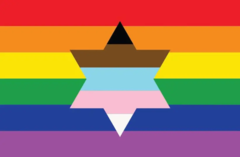Jewish TradiTions and Thanksgiving Through Gratitude
11/01/2024 09:28:20 AM

In the past, I celebrated Thanksgiving without giving it much thought. In school, I learned the “traditional story” of Thanksgiving: The Pilgrims were so thankful they survived a winter and were able to produce a harvest that they celebrated with a special feast. Thanksgiving’s theme of religious freedom resonates with Jewish history. The Pilgrims sought a place where they could practice their religion freely which intersects with the Jewish history of exile, migration and the desire for religious freedom. Yet the story of Thanksgiving often overlooks the reality of what happened when Europeans arrived in America, it leaves out the Native American perspective.
There is a lot of controversy, bias and harmful stereotypes surrounding Thanksgiving. To me, Thanksgiving really meant a long weekend with family, laughter and of course, food. As I have gotten older and now have grown children, I tried to take a closer look at the holiday and what it represents. As a family we focus on the gratitude element and have integrated important ideas from Judaism. Although a secular holiday, celebrated by people of all backgrounds, the idea of a time of togetherness and gratitude, hakarat hatov, resonates. After all, being grateful is a central component of Jewish life, routine and rituals.
From the moment Jews wake up we are supposed to be filled with a sense of gratitude, and verbalize this through the Modeh Ani. This prayer is recited in the morning to show gratitude for waking up. Before Jews do anything else, before planning the day, thinking about the million and one things that have to be done, we are asked to take a moment of gratitude. Another common recognition of gratitude is the Shehecheyanu. We recite this prayer every time we see or do something new in a given year. This prayer helps to recognize that this moment is special and we are thankful for being able to partake in it. As you might imagine, we say this prayer a lot in the preschool.
As the Director of Early Childhood Education, I can find many things to be grateful for: the incredible daily hugs, smiles and laughter, the team I am fortunate to work alongside, watching an educator excited about their lessons, when a child learns how to use the monkey bars, or write their name for the first time. The list could go on and on. But like any busy person I also can get lost in the everyday moments of life and lose some of the critical elements and benefits of gratitude.
Taking a moment to stop and reflect on the moment is crucial for building gratitude and appreciation. Children, especially young children, are experiencing and doing something new all the time and are often extremely proud and excited about it. We can take these wonderful moments to pause from our busy lives and take notice, say the Shehecheyanu, express and celebrate our gratitude for sharing this moment with a child. If the Shehecheyanu isn’t meaningful to you, create your own tradition, something that is meaningful to you and your family to celebrate a moment of gratitude. Whether or not you believe in G-d, the value of gratitude and being thankful for arriving at a moment is a universal value.
A tradition at my Thanksgiving Day table is saying who or what we are thankful for this year. As the New Year has also just begun, I encourage us all to not only share our gratitude on Thanksgiving but rather to find daily, weekly and monthly moments to think about and share our gratitude on a regular basis.
Thanksgiving books about gratitude:
- Rivkah’s First Thanksgiving by Sandra Bornstein
- Not This Turkey by Jessica Steinberg
- Give Thanks by Naomi Shulman
 |
 |
|
Additional Voices articles at sholom.org/our-voices.







